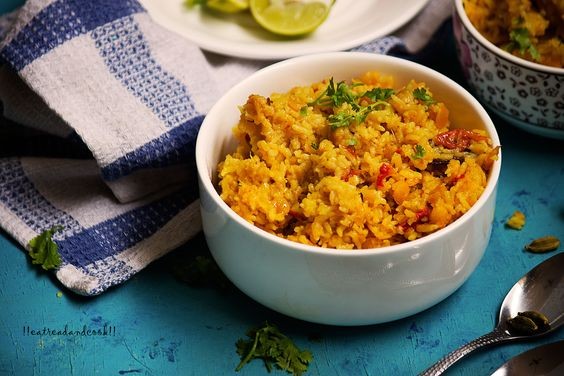The Peculiar Case of Khichdi
If you ask any South Asian kid what their least favorite food is, you will always get one of two answers - karela (bittergourd) or khichdi (a rice dish made with lentils, resembling Italian risotto). Traditional Khichdi does not have the richness or sophistication of a risotto, reserved solely for sick days when a child has the flu or a bad cold. It's usually a soggy mush of lentils and rice, tinged yellow with turmeric and seasoned with salt and pepper. Seems like a far leap from the rich curries and vegetable dishes associated with Indian culture, right? But, at my house, Khichdi was never a boring affair. My mother was raised in a tiny village tucked away in the shadows of the bustling metropolitan city of Kolkata, called Shantiniketan. Bengali cuisine, if you're unaware, is known for the sharp taste of mustard oil, setting your palate up for the tantalizing flavors of fresh fish and vegetables simmering in the most luxurious broth. Any dish is incomplete without small mountains of fluffy white rice, adorned with a small teaspoon of clarified butter or ghee and a dollop of fiery red pickle. I would watch as my mother would stand on her tiptoes, her silver anklets jingling softly as she tried to reach the far back of the wooden cabinets. She was too short, and would call for my dad with a “soon cho?” (are you listening?) instead of his name. I have never heard my mother refer to my father by name, and true to her call, he always listened. He would put down his newspaper and walk into the kitchen, silently retrieving the tarnished container of lentils, with the special type of daal reserved for sick days. She would reach into the container with her bare hands and grab fistfuls of the tiny yellow grains, adding them to a pressure cooker with short-grained basmati rice. He would share a look with her, probably reveling in some kind of inside joke, as she asked him to put the container away. She would giggle, swat at him and tell him to get out of the kitchen. Maa would wash the mixture three times, until the cloudy water would run clear, and fill it with fresh water to the top. She would then reach for her trusty jar of turmeric and add in heaping tablespoon to the concoction, along with some salt, and I would run away as far as possible. I hated the sound of the pressure cooker, the huffing and puffing seeming like the world's worst steam engine, building up to the dreadful moment where the steam would escape with a loud whistling noise. I would count in my head every time the whistle made me want to jump out of my skin, one… and when I least expected it, two. It always made my mum laugh, and she would gently smack my head saying, “beta (child), it's just the whistle.” I would follow her to the kitchen, and watch as she chopped up some red onions and tomatoes into small cubes. It never made her cry, unlike my Dad who would start sniffling while peeling the skin. She heated up a small pot with mustard oil, waiting for the right moment to add the mustard and cumin seeds, freshly plucked curry leaves from our small garden and freshly ground spices. It was my favorite part, I loved watching the spices bloom in the oil - bright red chillies, black pepper and earthy coriander blending into the most wonderful symphonies of flavor. She would add the onions and tomatoes last, barely cooking them so the onions were still translucent and had a slight bite to them, and the tomatoes retained their fresh tart flavor. She would then open the pressure cooker, greeted with a cloud of hot steam as she poured the mixture into the rice-lentil concoction. The colors would change; the khichdi would go from a dull and boring yellow to a vibrant vermilion shade, studded with onions and tomatoes and curry leaves. It had to be served steaming hot, on the nice ceramic plates reserved for guests, adorned with a heaping tablespoon of ghee. It did not matter what ailment you were suffering from, neither did it matter if your head felt like it was stuffed with cotton, or your body was burning with a fever. I've been sick a lot of times in the past few decades, with friends and lovers offering comfort in the form of their home remedies. I have been fed comfort foods from all over the world, be it Arroz Caldo from the Philippines, Italian Pastina, or bright red Borscht. A past boyfriend would make me chicken soup from the can, boiled in a saucepan with a dash of pepper and a generous pour of sriracha. My best friend makes the best rasam, a fragrant soup originating from the South of India, flavored with fresh tamarind and tomatoes. Yet, every single time I wake up with a bad cold or when life seems to get the best of me, I reach for the container of red daal at the back of my kitchen cabinets. I make it just the way maa would, relishing in the warmth of a hug that has traveled through generations of Bengali women to reach my little kitchen.







_-_the_remorse_of_orestes_(1862)_media.jpg)
